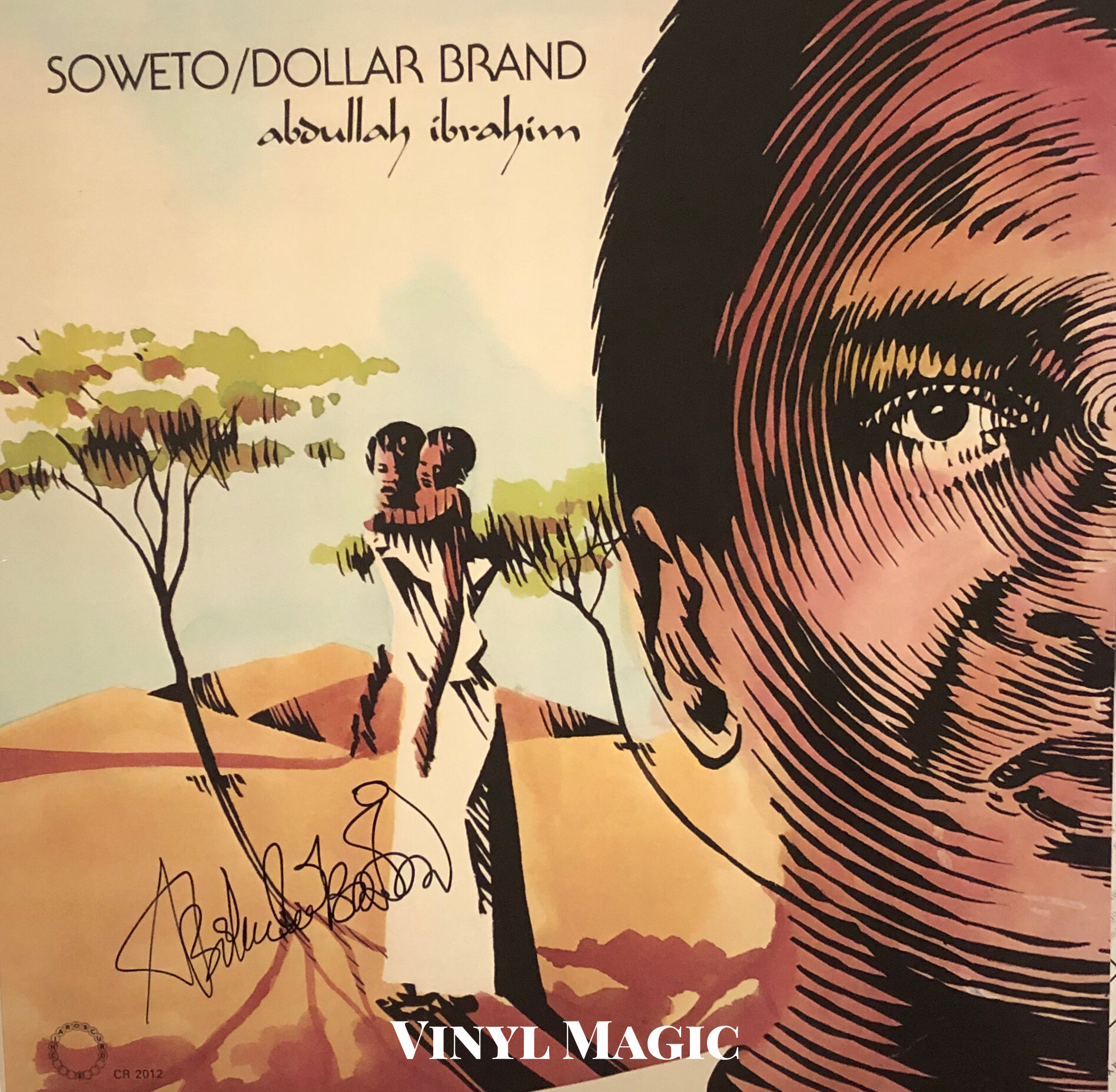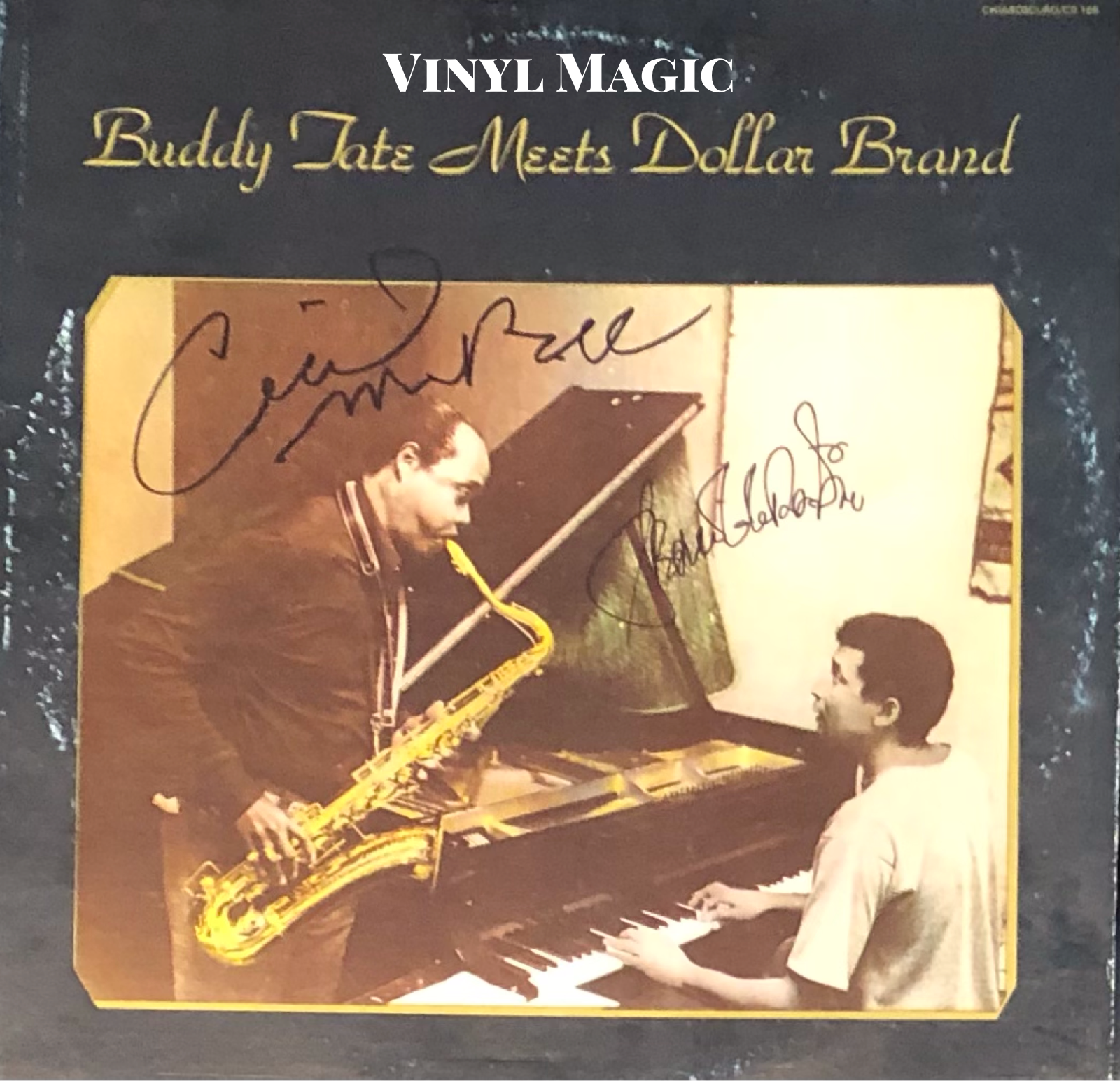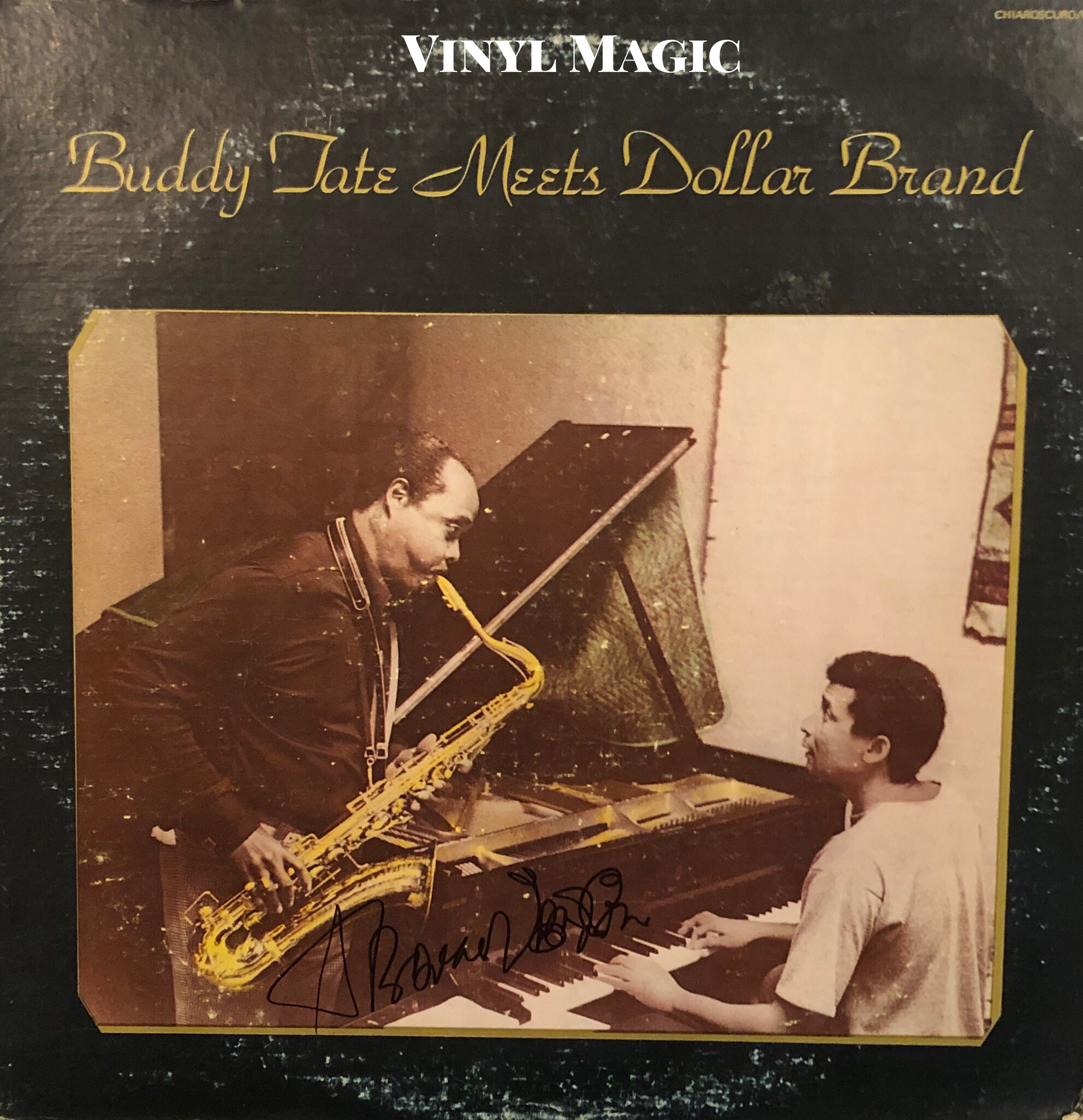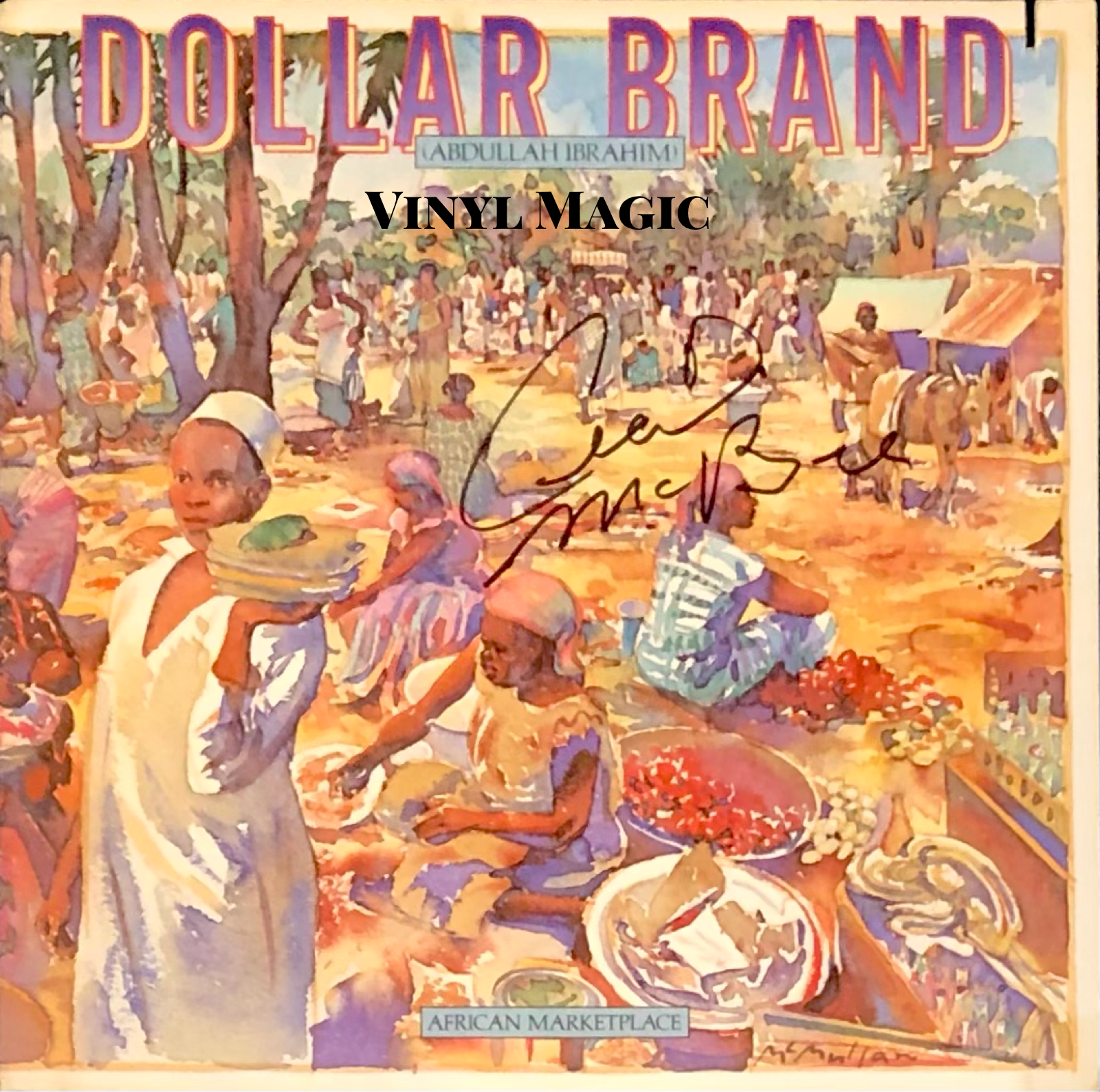Abdullah Ibrahim, South Africa and Me…
Wherever we are as musicians, jazz musicians or contemporary musicians, there's no way you can escape Ellington, or the influence of Ellington. So in South Africa, we grew up with Ellington, and for me, as a pianist and composer, Ellington was, and still is, one of the primary forces in music. He gave us guidelines and guidance, and for us, Ellington was not just an American, he was just a wise old man in the village.
Abdullah Ibrahim
Duke Ellington Presents The Dollar Brand Trio (1963) signed by Abdullah
Composition means you have to be composed so the message can flow through you - it's like a state of Zen. It serves as a purification, and it's a high. The only way down is to let yourself become the vessel of the almighty.
Abdullah Ibrahim
If what I grew up with in South Africa is world music, I don't know what it means. Perhaps it's to identify it as folklore, but what makes it separate? Satchmo (Louis Armstrong) said, 'All music is folk music. I never heard a horse sing.' The only criterion I have is whether it moves you.
Abdullah Ibrahim
Soweto (1978) signed by Abdullah
if you want to be a jazz musician, you go back to Jelly Roll Morton, Ellington, Monk. With us, we were the first; there were no improvisers before us. We had to devise our own vocabulary. With any improvisation, you're going into uncharted waters, putting your life on the line. But Jazz music helps you do that without fear.
Abdullah Ibrahim
Ode To Duke Ellington (1973) signed by Abdullah
Born Adolph Johannes Brand in Cape Town, South Africa in 1934, Abdullah Ibrahim is one of the great jazz pianists and composers. He was surrounded by music as a child, a swirl of African Khoi-san music mixed in with spirituals and gospel which he learned from his grandmother who was the pianist for a local African Methodist Episcopalian Church, and his mother who steered the choir. He started taking piano lessons at seven, and performed professionally by age fifteen. He was a quick and voracious study.
Though he wanted to study medicine, Ibrahim was denied because of his race, nor was he allowed to attend the music conservatory. As he later confided, "So I decided to study on my own - I'm still studying. The quest for knowledge was insatiable in the ghetto. We were reading Langston Hughes and Richard Wright, Shakespeare, the Bhagavad Gita, Confucius. We realized that though we were in bondage, our minds were not."
Ibrahim was lucky to survive the strife that surrounded the rough neighborhood where he grew up, as he later recounted, "We grew up drinking alcohol and smoking pot, and I lost a lot of close friends to gangs and prison. They died of addiction or were murdered. The thing that saved me was the music. In all that horror, it was at least clean, you were dealing with something beautiful."
By the late 1950s, he formed the Dollar Brand Trio (he converted to Islam in 1968 and took his current name) and in 1959 formed the Jazz Epistles with Hugh Masekela on trumpet, Kippie Moeketsi on saxophone, Jonas Gwanga on trombone, Johnny Gertze on bass, and Makaya Ntshoko on drums. This extremely talented band would go on to release the first jazz album in South Africa, an historic and important occasion. The epicenter of jazz and creativity in Cape Town was District Six, as Ibrahim recalled, "A fantastic city within a city. Where you felt the fist of apartheid, it was the valve to release some of that pressure. In the late 50s and 60s, when the regime clamped down, it was still a place where people could mix freely. It attracted musicians, writers, politicians at the forefront of the struggle. We played and everybody would be there."
The Journey (1977) signed by Abdullah
The bonhomie and good times didn't last long, however, as the Sharpeville Massacre of 1960, the imprisonment of Nelson Mandela, and the banning of the African National Congress (ANC) stymied artistic, human and musical development on all levels, and artists like Ibrahim, Hugh Masekela, Miriam Makeba and others lit out for new territories. In 1962, Ibrahim and his girlfriend (later his wife), singer Sathima Bea Benjamin, settled in Zurich, Switzerland and undertook a three year contract playing at the Club Africana. There, in 1963, after attending a Duke Ellington concert, Sathima cajoled and persuaded the great Duke Ellington to see her husband perform at the Club Africana after Duke's concert. Her persistence paid off, as Duke attended a late night gig at the club, and was very impressed by what he heard. He signed Dollar Brand (as he was then known), and produced and recorded an album in Paris, Duke Ellington Presents The Dollar Brand Trio. It was Ibrahim's first solo album in a career that would span sixty-plus years and more than ninety albums, including his most recent release Balance in 2019. There was a beautiful symmetry to the serendipitous meeting between Duke, Ibrahim and his wife which he related, "She was a young vocalist and somebody asked me if I could accompany her for a concert in Cape Town, which I agreed. You know, pianists don't like to play for vocalists. When I arrived at the rehearsal studio, there was this very beautiful lady, and I asked her, 'What are you going to sing?' She said, 'I Got It Bad, (And That Ain't Good.)' It was amazing because I was working on the song, the Ellington song myself. So that created that bond even before we met Ellington." The album sold well and led to other opportunities with Ibrahim playing clubs, concert halls, and theaters all over the world, which continues to this day.
If Duke Ellington was Ibrahim's primary influence, Thelonious Monk was clearly second, especially with regard to composition. Ibrahim explained, "At a very early age, I was compared to Monk and Debussy. But for us, what Monk did was so natural; the rhythmic approach people found weird was totally in the African tradition. When I met him, I said, 'Thank you for all the inspiration.' He was so surprised. He said, You're the first piano player to tell me that.' "
Buddy Tate Meets Dollar Brand (1977) signed by Abdullah, Cecil McBee
After some riotous and reckless living, Ibrahim converted to Islam in 1968 and credits the religion with saving his life, "Music was part of the reason, because in Islam the music is naturally integrated. You don't just feel the Koran, you sing it, in remembrance of Allah. I had gone through a bad period, partly in New York. I stopped smoking, I stopped drinking, found an inner peace. There is nothing really I want or need for myself now, because Allah has blessed me. My main concern is for others, for the liberation of my people, the establishment of justice. Music is just a means toward the end." The writer Mandla Langa concurs, "But for religion, Abdullah would have been dead. He's very disciplined, single-minded. Martial arts and music became self-reinforcing themes in his life."
Eventually, Ibrahim and his wife moved to New York City (even living in the Chelsea Hotel for a long time), as did many of his fellow South African jazz artists, a diaspora of exiles and expats in search of a more welcoming and creative environment. Ibrahim would remain in exile until the early 1990s when Nelson Mandela was released, although his intermittent visits, concerts and recordings provided excitement and relief to a beleaguered nation, especially during the scourge of the Apartheid years. Of his song "Mannenberg" (renamed "Cape Town Fringe" on its 1975 US release) which became an anthem for the struggle against Apartheid, Ibrahim recalled its unusual origin and success. While he was in the studio recording other songs, he saw an upright piano, similar to the ones he had played at home and in small clubs. "I thought, 'Great, an old upright piano,' I touched this piano, and I thought, 'What?' I sat at this piano, and it goes first time (the opening notes of Mannenberg). Wow! This thing sounds so nice, it's grooving. I tell my musicians that I work with, that a lot of music is written right there. So they bring pens and pencils and paper. I'm a composer, you don't know when it's going to happen. So this is how "Mannenberg" was written." The muse had struck. Ibrahim and his colleagues, especially saxophonist Basil Coetzee, completed the thirteen minute song in one take, an intoxicating groove which belies its intense subject matter - the annexation in District Six and the removal and bulldozing of ancestral homes that was so abhorrent and, unfortunately, so common in 1970s South Africa.
Cape Town Fringe (1974) signed by Abdullah
While they knew they had a great song, now they had to sell it. Among the record companies in South Africa, they found no takers, “So now we're in Johannesburg, nobody wants it. (Recording engineer) Rashid Vally has this little record shop, so I say to Rashid, 'Why don't we just make demos and put loudspeakers outside and play them?' We sold over 10,000 in two weeks over the counter without covers... it was incredible." Remarkable, even more remarkable when you consider a hit in South Africa in those days sold 20,000 copies in total.
The song and its significance became part of the cultural fabric of South Africa, as Ibrahim allowed, "And the public and the people picked up the song, and it was played and sung everywhere. And, in some regards, it has become almost like an unofficial national anthem of South Africa." A hit in 1975, it was revived at anti-apartheid protests and rallies in the 1980s and 1990s. Writer Mandla Langa explained, "The tune became a popular metaphor for all the townships where trouble brewed." The song was also smuggled into Robben Island and played for the still incarcerated Nelson Mandela, the first music Nelson had heard in decades. Ibrahim also played at the 1994 inauguration of Nelson Mandela, an event which I'm sure he never thought would occur. As Minister of Finance Trevor Manuel so eloquently eulogized Ibrahim colleague and saxophonist Basil Coetzee in March 1998, "It seems like just yesterday that I first heard that riff... that special sound that helped build that wider family during a time of deep repression, when speech was not enough. That sound which is something we can feel but not explain, which gave voice to the speechlessness of those times." An amazing song by equally amazing musicians.
Black Lightning (1976) signed by Abdullah
I saw Ibrahim recently at the Jazz Standard in New York City. He performed with his band Ekaya, consisting of baritone and tenor saxophone, trombone, bass and drums. The show started with Ibrahim on stage alone playing the ruminative ballad "Dreamtime." Blessed with an exquisite touch, he spaced his notes with deliberate care. It was elegantly beautiful. Then the bassist joined him with a bow, along with a flautist. More like chamber jazz on this track, each song flowed seamlessly into the next, a sprawling suite of uncompromising beauty and elegance. Ibrahim would play solo and then a knowing glance to his fellow musicians off stage would beckon them to join him as they did in mid-song. Languid blues would be followed by free jazz, a cascading cacophony of notes supplied by the formidable front line of trombone, baritone and tenor saxophone. Even "Mannenberg" made an appearance, its jaunty and rollicking groove punctuated by several fine saxophone solos. Near the end of the performance, he worked in "Skippy" from the pen of Thelonious Monk, a cut from his recent release Balance. It was disjointed and dissonant, perfectly imperfect in the Monk tradition. Overall, a beautiful night of music rendered by expert musicians.
Now it was time for a visit to get some vinyl signed. When I met him back stage, Ibrahim was peaceful and humble like the Zen master he is. I thanked him for his wonderful performance and handed him some of my favorite records. When he signed his first album Duke Ellington Presents Dollar Brand, he grew pensive, "Duke was a great man. We all stand in his shadow." He smiled warmly as he signed Cape Town Fringe, a seminal album in the struggles of the South Africa, "That was a lot of fun to record." I thanked him again for his time, and especially his music. I was reminded of one of his recent statements, "Some do it because they have to do it. We do it because we want to... so we do not require much sleep, so we have to do it."
Thanks Abdullah Ibrahim for the inspiration and hope. Sleep is definitely overrated!
Buddy Tate Meets Dollar Brand (1977) signed by Abdullah
Choice Abdullah Ibrahim Cuts (per BKs request)
https://www.youtube.com/watch?v=Get3oF_ibuo
“Manenberg” (1974)
https://www.youtube.com/watch?v=Yq9OqWdJ7x4&t=225s
“Dreamtime” and “Nisa” Solo Piano live at Paste Studios, 2019
https://www.youtube.com/watch?v=f3B2LYP65ow
“The Pilgrim” Mannenburg- Is Where It’s Happening (1974)
https://www.youtube.com/watch?v=b4kO98avbDg
“Black Lightning” (1976)
https://www.youtube.com/watch?v=4YvSKhMiVnA
“Skippy” The Balance (2019)
https://www.youtube.com/watch?v=HhACPRwzIOo
“Soweto” (1976)
https://www.youtube.com/watch?v=LL_k5Q5WEBs
“African Herbs” (1976)
https://www.youtube.com/watch?v=aBf7yGbxtHw
“Water From An Ancient Well” (1985)
African Marketplace (1980) signed by Cecil McBee








